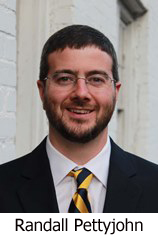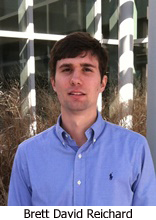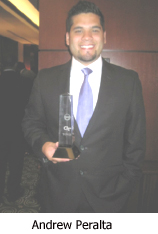The aspirations of three geotechnical engineering undergraduates got a much-needed boost this past year, thanks to a scholarship from the ConeTec Education Foundation.
 The students, Randall “Randy” Pettyjohn, Brett David Reichard, and Andres Peralta, each received a $2,500 scholarship from the foundation, which is dedicated to developing talented students, new knowledge and skills to advance the science of geotechnical site investigation.
The students, Randall “Randy” Pettyjohn, Brett David Reichard, and Andres Peralta, each received a $2,500 scholarship from the foundation, which is dedicated to developing talented students, new knowledge and skills to advance the science of geotechnical site investigation.
“The past year really helped to deepen my appreciation for the knowledge base of my professors in this field,” said Pettyjohn, who will begin a one-year master’s program at Georgia Tech this summer.
“I was able to work with Professor [Susan] Burns on a research project on in situ soil testing. I did an extensive literature review and, this summer, I will begin doing field work that is sponsored by GDOT.”
Pettyjohn said his academic and research experience at CEE have confirmed his choice to “go back to school” after working for seven years in the construction trade.
“As I progressed through courses and completed my first [engineering] internship, my interest in the geotechnical field has solidified. I find geotech the most interesting because the discipline has a hands-on approach to mechanics, hydraulics, and construction where creativity and a working knowledge of local geology are critical.”
 A 2013 recipient of Georgia Tech’s Henry Ford II fellowship, Reichard has been actively involved in undergraduate research for quite some time. Working alongside Georgia Tech faculty Dr. Julian Rimoli and Dr. Massimo Ruzzene since 2011, he helped produce “Mechanical Characterization of Structured Materials for Adaptive Wave Management,” in which the topologies of multiphase materials were altered and multiphase material strains were characterized.
A 2013 recipient of Georgia Tech’s Henry Ford II fellowship, Reichard has been actively involved in undergraduate research for quite some time. Working alongside Georgia Tech faculty Dr. Julian Rimoli and Dr. Massimo Ruzzene since 2011, he helped produce “Mechanical Characterization of Structured Materials for Adaptive Wave Management,” in which the topologies of multiphase materials were altered and multiphase material strains were characterized.
Lately, he’s turned to another area of research.
“The ConeTec scholarship helped me to begin my work with Dr. Frost, where we are analyzing the PVC geo-membranes that line landfills to better understand how to make that material stronger,” he said.
“This year I was able to review the shear strength results and failure rates that are already out there, and what I found was, there wasn’t a lot of variability. That gave us the idea to look at another aspect of the material: we are going to use microphones to draw correlations between the noise friction and the interface shear strength.”
Columbia native Andres Peralta said he has spent much of his undergraduate career focusing on the impact that soil has on various civil engineering projects. He plans to further that interest by doing research on the behavior of geogrids in roadways with CEE faculty Dr. David Frost.
impact that soil has on various civil engineering projects. He plans to further that interest by doing research on the behavior of geogrids in roadways with CEE faculty Dr. David Frost.
“What’s fascinating about geotechnical engineering is that if the soil is not suitable for a specific purpose, it can be strengthened with different techniques that have been developed over the years such as compaction, or inclusion of different reinforcing materials like geogrids, metal strips, tie backs and piles,” said Peralta, who plans to finish his undergraduate degree in December.
“I would like to know and understand the different in-situ soil testing procedures available, so I can use the different testing methods available to correctly identify the characteristics and behavior of the soil being analyzed, and provide a more accurate and effective solution.”
